|
|
|
Sort Order |
|
|
|
Items / Page
|
|
|
|
|
|
|
| Srl | Item |
| 1 |
ID:
133845
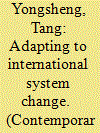

|
|
|
|
|
| Publication |
2014.
|
| Summary/Abstract |
Understanding the transition happening in the international system requires a balance between old logic and new reality. As the power pattern changes and the characteristics of international order unfold, the complications of global politics, casual relationships among different issues, and the echoing effects of strategic choices will lead to greater need for global governance. The logic of simple power politics will not be enough when strategists confront nontraditional challenges.
|
|
|
|
|
|
|
|
|
|
|
|
|
|
|
|
| 2 |
ID:
127066
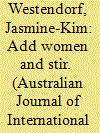

|
|
|
|
|
| Publication |
2013.
|
| Summary/Abstract |
With the changing nature of warfare and the increasing awareness of the specific gender dimensions of war and peace, the international legal framework has been expanded to address the particular challenges faced by women in conflict and post-conflict contexts. This process culminated in 2000 with the first United Nations document to explicitly address the role and needs of women in peace processes: United Nations Security Council Resolution (UNSCR) 1325 on women, peace and security. Thirteen years on, this article assesses the extent to which Australia's stated commitment to women, peace and security principles at the level of the international norm has translated into meaningful action on the ground in the Regional Assistance Mission to Solomon Islands (RAMSI). The analysis shows that despite it being an ideal context for a mission informed by UNSCR 1325, and Australia being strongly committed to the resolution's principles and implementation, the mission did not unfold in a manner that fulfilled Australia's obligations under UNSCR 1325. The RAMSI case highlights the difficulty in getting new security issues afforded adequate attention in the traditional security sphere, suggesting that while an overarching policy framework would be beneficial, it may not address all the challenges inherent in implementing resolutions such as UNSCR 1325
|
|
|
|
|
|
|
|
|
|
|
|
|
|
|
|
| 3 |
ID:
147232
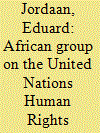

|
|
|
|
|
| Summary/Abstract |
During the early years of the United Nations Human Rights Council, formed in 2006, the African Group obstructed efforts to scrutinize and improve human rights in specific countries, notably in the cases of Darfur and the Democratic Republic of the Congo. However, in recent years the African Group has become willing to address country-specific human rights violations, particularly in Côte d'Ivoire, Libya, and Eritrea. This article documents the African Group's shift and asks why it occurred. Against the backdrop of debates about whether the liberal international order can survive a decline in American dominance, the study of the African Group's shift grants us insight into the elements that underpin liberal internationalism. Three explanations for the African Group's shift are considered: an improvement in the domestic human rights profile of African Group members, changes to the internal dynamics of the African Group, and the influence of the United States. The article concludes that American power was decisive, a finding that raises doubt about whether the liberal international order will survive a decline in American power.
|
|
|
|
|
|
|
|
|
|
|
|
|
|
|
|
| 4 |
ID:
110828
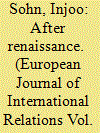

|
|
|
|
|
| Publication |
2012.
|
| Summary/Abstract |
Why does a re-emerging China pursue institutional strategies to expand its multilateral ties all over the world? This study explains the genesis of China's new multilateral diplomacy toward Africa, Latin America, and the Middle East. The central argument of the study is that many strands of structural arguments drawn from realist, liberal, and constructivist insights cannot provide complete explanations about China's multilateral activism without recourse to cognitive feedback dynamics. China fed its regional experiences of multilateralism back into its global policy formation. This experiment-based approach has been a pervasive feature in Chinese multilateral diplomacy as well as Chinese domestic reforms during the post-Mao period. The cognitive feedback model developed in this study intends to complement the prominent structural explanations by identifying micro-level dynamics and seeks to contribute to today's debate over power transition and international order.
|
|
|
|
|
|
|
|
|
|
|
|
|
|
|
|
| 5 |
ID:
105977
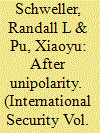

|
|
|
|
|
| Publication |
2011.
|
| Summary/Abstract |
The emerging transition from unipolarity to a more multipolar distribution of global power presents a unique and unappreciated problem that largely explains why, contrary to the expectations of balance of power theory, a counterbalancing reaction to U.S. primacy has not yet taken place. The problem is that, under unipolarity and only unipolarity, balancing is a revisionist, not a status quo, behavior: its purpose is to replace the existing unbalanced unipolar structure with a balance of power system. Thus, any state that seeks to restore a global balance of power will be labeled a revisionist aggressor. To overcome this ideational hurdle to balancing behavior, a rising power must delegitimize the unipole's global authority and order through discursive and cost-imposing practices of resistance that pave the way for the next phase of full-fledged balancing and global contestation. The type of international order that emerges on the other side of the transition out of unipolarity depends on whether the emerging powers assume the role of supporters, spoilers, or shirkers. As the most viable peer competitor to U.S. power, China will play an especially important role in determining the future shape of international politics. At this relatively early stage in its development, however, China does not yet have a fixed blueprint for a new world order. Instead, competing Chinese visions of order map on to various delegitimation strategies and scenarios about how the transition from unipolarity to a restored global balance of power will develop.
|
|
|
|
|
|
|
|
|
|
|
|
|
|
|
|
| 6 |
ID:
131427
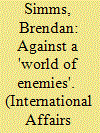

|
|
|
|
|
| Publication |
2014.
|
| Summary/Abstract |
Adolf Hitler's experiences during the First World War have been much discussed, with historians tending to concentrate on his involvement in the fighting and the operational lessons he later claimed to draw. Much less has been written about the impact of the war on his world view, though recent work has tended to suggest that his paranoid anti-Semitism was not yet visible during the conflict. Drawing on this latest research, but also on newly discovered sources and previously underused material, the author shows that Hitler's main preoccupation during the war and its immediate aftermath was the overwhelming power of Great Britain and its American ally. He associated these two powers with the alleged international Jewish economic conspiracy that had crushed the German empire. Hitler's anti-Semitism thus originated in an anti-capitalist, rather than anti-communist, discourse. He blamed Britain and the US for the rigours of the Versailles peace settlement, a moment which was far more politically formative for him than the experience of defeat itself. His encounter with American soldiers in the summer of 1918 also marked his first engagement with the global power of the United States and the start of a belief in the demographic weakness of the German empire which inspired his plans for Lebensraum in the east.
|
|
|
|
|
|
|
|
|
|
|
|
|
|
|
|
| 7 |
ID:
132170
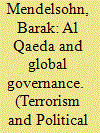

|
|
|
|
|
| Publication |
2014.
|
| Summary/Abstract |
In recent years, statements by al Qaeda leaders have included references to topics often associated with global-governance proponents' critique of the state. This article examines the organization's attitude toward symbols of global governance, giving particular attention to its view of the United Nations as the foundation for global governance, and to the manner in which al Qaeda approaches the central questions of environmental threats and human rights. The organization is seeking to insert itself into the discourse of global governance and use it in an instrumental manner; it focuses on anti-Western narrative and seeks to expose the existing order as designed by Western powers, particularly the United States, for self-serving reasons. However, the article argues, notwithstanding al Qaeda's reputation for sophistication in manipulating public opinion, the organization's references to global governance underscore the limitations its rigid ideology imposes on its messaging efforts. Even though adopting the global governance discourse is in line with the group's effort to improve its image, al Qaeda's extremist ideology limits its ability to take full advantage of the benefits this discourse offers.
|
|
|
|
|
|
|
|
|
|
|
|
|
|
|
|
| 8 |
ID:
124535


|
|
|
|
|
| Publication |
2013.
|
| Summary/Abstract |
This study examines Al Qaeda's organizational dynamics, doctrinal precepts, strategic objectives, operational priorities, and tactical vectors in the context of its Twenty-Year Strategic Plan. This seven-stage Strategic Plan is addressed with a particular focus on its current phase (Stage 5), 2013-2016, involving the mobilization of Muslim forces for the "Declaration of the Caliphate." In this regard, particular attention is paid to the Al Qaeda engagement in militant jihadist campaigns across the Middle East and other Muslim domains. The study concludes with an overall assessment of global threats and ongoing risks arising from the current phase of Al Qaeda's Twenty-Year Strategic Plan.
|
|
|
|
|
|
|
|
|
|
|
|
|
|
|
|
| 9 |
ID:
139574
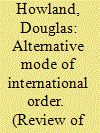

|
|
|
|
|
| Summary/Abstract |
A novel form of international order was developed in the nineteenth century by international administrative unions such as the International Telegraph Union and the Universal Postal Union. This administrative internationalism posed a striking alternative to the international society of great powers, sovereignty, and forms of imperial domination, for the members of administrative unions included not only sovereign states but also semi-sovereigns, vassals, and colonies. Members were equal and bound identically to the union treaty and its international administrative law. This article examines the structure of unions and their politics of membership in the nineteenth century, and engages theories of global governance to argue that early administrative unions present a mode of international order different from theories of both global networks and the international system of neorealism.
|
|
|
|
|
|
|
|
|
|
|
|
|
|
|
|
| 10 |
ID:
130871
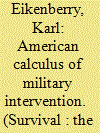

|
|
|
|
|
| Publication |
2014.
|
| Summary/Abstract |
The protracted campaigns in Afghanistan and Iraq have diminished America's appetite for waging wars to end tyranny or internal disorder in foreign lands. Military interventions have traditionally been a source of controversy in the United States. But America's appetite for the dispatch of armed forces has been diminished greatly by factors that have primarily emerged in the twenty-first century. These include, most painfully, the protracted campaigns in Afghanistan and Iraq that have made US political and military leaders more cautious about waging wars to end tyranny or internal disorder in foreign lands.
|
|
|
|
|
|
|
|
|
|
|
|
|
|
|
|
| 11 |
ID:
127311
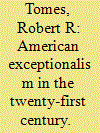

|
|
|
|
|
| Publication |
2014.
|
| Summary/Abstract |
Americans still believe their country is unique but are less convinced it has a special responsibility to lead. This has both domestic and international implications.
|
|
|
|
|
|
|
|
|
|
|
|
|
|
|
|
| 12 |
ID:
132006
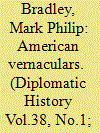

|
|
|
|
|
| Publication |
2014.
|
| Summary/Abstract |
On a wintry January evening in 1973, the members of Amnesty International USA Group 11 gathered on the Upper East Side of New York City to adopt a new prisoner of conscience, Sutanti Adit of Indonesia. Adit, a medical doctor and the wife of the leader of the Indonesian Communist Party, had been arrested and imprisoned in the ruthless campaigns of repression that followed a failed 1965 coup against the Sukarno government, which had ruled Indonesia since its formal independence from Dutch colonial control in 1950. She was among more than a hundred thousand Indonesians arrested, interrogated (often under torture), and imprisoned by the state. As many as fifty thousand of them remained in custody for more than a decade housed in prison camps whose sanitation, medical facilities, and food were inadequate at best. They were permitted very limited contact with the outside world, including family and friends, and harshly mistreated by prison guards.1
|
|
|
|
|
|
|
|
|
|
|
|
|
|
|
|
| 13 |
ID:
130897
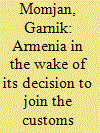

|
|
|
|
|
| Publication |
2014.
|
| Summary/Abstract |
I will speak about the situation in Armenia. On September 3, 2013 at the meeting with President Putin in Moscow, our President Serzh Sargsyan announced that Armenia would join the custom union. This statement echoed all over the world : in the evening, all leading information agencies and the media - BBC, Euronews and the Wall Street Journal were discussing it; they concluded that Russia had put pressure on Armenia.
|
|
|
|
|
|
|
|
|
|
|
|
|
|
|
|
| 14 |
ID:
191734
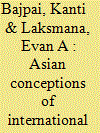

|
|
|
|
|
| Summary/Abstract |
How do major Asian states regard the current international security order? Do they agree or disagree among themselves? This is an introduction to a special section on ‘Asian conceptions of international order: what Asia wants’. It draws on articles analysing the stances of China, India, Japan, South Korea, Indonesia, Malaysia, Singapore, Thailand, Philippines and Vietnam towards the existing international security order usually described as a liberal international order (LIO). It argues that Asian states substantially support the main constitutive and regulatory norms and institutions of the LIO, but they worry that the LIO does not consistently honour these norms. Asians disagree on the centrality of political liberalism, but even Japan and South Korea, the most liberal states, are uncomfortable with strident criticism, punishment and the exclusion of less liberal states. Asians also disagree on the role of US alliances: some are strongly supportive, some are ambivalent and some are negative. Finally, Asians disagree on how they voice dissatisfaction. Japan and South Korea supplement existing norms and institutions as a way of transcending the limitations of the LIO; south-east Asian states promote ASEAN's mediatory role for peace and security above and beyond existing global arrangements; and Indonesia, India and China want to move from being norm takers to becoming norm shapers. The introduction ends with six policy implications.
|
|
|
|
|
|
|
|
|
|
|
|
|
|
|
|
| 15 |
ID:
130606
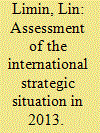

|
|
|
|
|
| Publication |
2014.
|
| Summary/Abstract |
The international strategic situation in 2013 appeared very calm than ever before and had no outstanding features; the fact of its having no special feature was its de?ning characteristic. Although 2013 could be
characterized as a normal year, the international strategic situation has undergone some profound changes. One of the most important is that the United States may have quietly given up its role of the "world police." The 'post-American era' has begun to arrive without attracting much attention in the international community. Many of these profound changes, including the long-term downturn of the world economy, the ongoing process of the West 's decline and the rise of the East, the endless chaos in the Middle East, readjustments in the international order and great power relations, and the evolving relationship between China and the U.S. are all closely related with this dawning of the 'post-American era.' Thus, the 2013
international strategic situation could be seen as holding the seeds of greater change than has been seen since the collapse of the Soviet Union in 1991.
|
|
|
|
|
|
|
|
|
|
|
|
|
|
|
|
| 16 |
ID:
165206
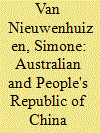

|
|
|
|
|
| Summary/Abstract |
Through qualitative comparative analysis of policy documents and official statements over the last 10 years (2008–2018), this paper examines Australian and PRC government conceptions of the international order and the associated policy implications. Their understandings of the international order are informed by their self-defined national role conceptions and perceptions of other states, and are manifested in discussions of institutional reform, international law and human rights. Australia's self-conception as a middle power informs its emphasis on maintenance and US leadership of the existing order, while the PRC's self-conceptions as both a developing and established power enable it to frame itself as either an upholder or reformer of the order. Both governments highlight the ‘rules-based’ mechanisms of the WTO, and are more likely to agree on trade and economic issues than on other matters. Their responses to the 2016 South China Sea arbitration tribunal decision and discussions of the role of human rights in the international order suggest less agreement is likely on international law and human rights norms. While Australia considers the PRC a potential challenger to the existing order, Australia does not feature in PRC discussions of international order, suggesting its limited ability to affect PRC foreign policy decisions.
|
|
|
|
|
|
|
|
|
|
|
|
|
|
|
|
| 17 |
ID:
131424
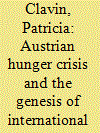

|
|
|
|
|
| Publication |
2014.
|
| Summary/Abstract |
From its foundation in 1918, the new Austrian republic was gripped by famine and a crisis of confidence in its currency that threatened to tip the new state into hyperinflation and revolution. This article shows how western efforts to aid Austria combat famine and its financial crisis were linked, and how they had a profound impact on the new League of Nations, the world's first multi-purpose intergovernmental organization. It also demonstrates the importance of the incipient wartime international bureaucracy for League agency. Contrary to the expectations of its architects, member governments, international financiers, businessmen and economists began to see the League as a useful tool to meet common needs that today would be called the search for human security. The article demonstrates how the Austrian food and financial crisis was the founding moment in the institutionalization of international economic and financial coordination, cooperation and oversight. It established the Economic and Financial Organization of the League of Nations, whose work would later inform its successors, the International Monetary Fund, the World Bank and the European Union. The study speaks to the ways in which the notion of security has broadened in the past two decades to embrace economic, social, political and environmental concerns. But the notion of 'human security' is not new; it was written into the body of the League.
|
|
|
|
|
|
|
|
|
|
|
|
|
|
|
|
| 18 |
ID:
145524
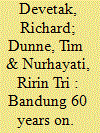

|
|
|
|
|
| Summary/Abstract |
This article examines the extent to which international society has been able to accommodate challenges such as the mid twentieth-century ‘revolt against the West’ and the twenty-first-century rise of new (especially non-Western) great powers. The Bandung conference of 1955 has commonly been seen as posing a threat to the fabric of international society by proliferating cultural and political differences. The authors show, on the contrary, that the political project of anti-colonialism and peaceful coexistence expressed at Bandung was actually consistent with a pluralist conception of international society, even if Western powers and intellectuals at the time failed to notice. The non-Western countries represented at Bandung were intent on expunging international society of the structures and practices of racism and colonialism so as to strengthen the foundations of a pluralistic international society better able to accommodate cultural and political differences.
|
|
|
|
|
|
|
|
|
|
|
|
|
|
|
|
| 19 |
ID:
126676
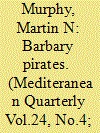

|
|
|
|
|
| Publication |
2013.
|
| Summary/Abstract |
This essay describes the piracy that took place in the Mediterranean from the time of ancient Greece to Barbary. It explains the corso, the sea war between nonstate but state-endorsed Christian and Muslim parties, with reference to the Knights of Malta and, more extensively, the Barbary corsairs. Although the essay focuses primarily on history, it also draws some conclusions about piracy and the international system today. The essay notes a prevailing assumption that contemporary piracy off Somalia and that perpetrated by the Barbary pirates is similar, but it further notes that any similarities are slight and superficial. At the same time, similarities rooted in economic, social, and political change do exist between all outbreaks of depredation at sea and the responses to them.
|
|
|
|
|
|
|
|
|
|
|
|
|
|
|
|
| 20 |
ID:
155240
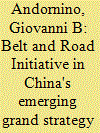

|
|
|
|
|
| Summary/Abstract |
As Chinese leaders endeavor to maintain the international environment aligned with their strategic aim of realizing the “dream of national rejuvenation,” the remarkable increase in China's capabilities, coupled with uncertainty in the global economy and the ambivalent attitude of the USA toward the international order, poses fresh challenges to Beijing's foreign policy. The present paper argues that a lexicographic preference for the mitigation of the risk of pushback against China's core interests underpins the Belt and Road Initiative. Pursuing a strategy of credible reassurance commensurate to the shift in the distribution of power in China's neighborhood and globally, President Xi Jinping's administration has been cultivating a form of connective leadership that commits China to the encapsulation of the Belt and Road Initiative for transregional connectivity into its own national development strategy, generating an octroyé, non-hegemonic, type of international social capital, and integrating the existing order without corroborating the position of its founder.
|
|
|
|
|
|
|
|
|
|
|
|
|
|
|
|
|
|
|
|
|